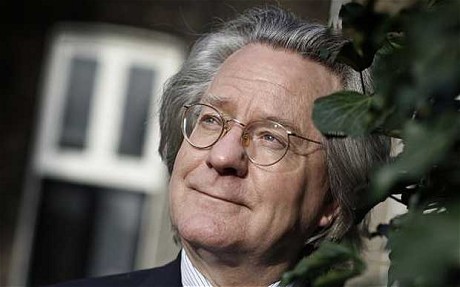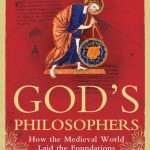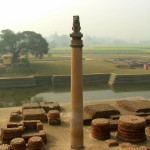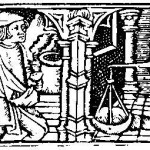Dark Ages and Secularist Rages: A Response to Professor A.C. Grayling
by Carl Olson
Filed under Culture, History
A few years ago, Professor A.C. Grayling, professor of philosophy at Birkbeck College, University of London, wrote a column titled "The persistence of the faithful" in The Guardian.
Grayling's column was ostensibly concerned with the apparent decision of the British government passing the "Equality Act," which would make it law that adoption agencies, including those run by the Catholic Church, would have to allow homosexual couples to use their adoption services. But Grayling's column touched on a number of larger issues, both historical and philosophical in nature, which deserve some further response.
My goals in this article are modest: to offer some context to situate this discussion in a larger and older debate, to suggest some resources that might be of interest to readers, and to critique some of the premises set forth by Professor Grayling. I am certainly not an historian, nor do I play one on television or on the Internet, nor am I a specialist in matters medieval. And so I readily draw upon the knowledge and work of those who know much more about some of these issues than I do, perhaps pointing curious readers to longer and more detailed works of history, philosophy, and theology.
Grayling's column states:
"Seven centuries after the beginnings of classical civilisation in the Greece of Pericles and Socrates, an oriental superstition, consisting of an amalgam of dying and resurrecting god myths and myths about the impregnation of mortal maids by deities, captured the Roman Empire. Such was the beginning of Christianity. By the accident of its being the myth chosen by Constantine for his purposes, it plunged Europe into the dark ages for the next thousand years - scarcely any literature or philosophy, and the forgetting of the arts and crafts of classical civilisation (quite literally a return to daub and wattle because the engineering required for towers and domes was lost), before a struggle to escape the church's narrow ignorance and oppression saw the rebirth of classical learning, and its ethos of inquiry and autonomy, in the Renaissance."
Grayling admitted in later comments that his column "was of course brief, conversational, rhetorical and polemical only." Fair enough, but it is readily apparent where he is coming from and what he thinks of Christianity: it is an intolerant and despondent mythology that thrives on ignorance, oppression, and the suppression of knowledge.
Grayling describes himself as a "humanist" and an adherent of what he calls "secular, free-thinking, classically rooted inheritance." He is an heir to the Enlightenment and thrives on the sort of anti-Christian polemics and dubious historical assertions that became the rage among many intellectuals during the Enlightenment era, so much so that he seems to be nearly entombed in a dusty (dare I say "old-fashioned") form of simplistic skepticism that was in style many decades ago.
So, for example, his description of early Christianity as "an amalgam of dying and resurrecting god myths and myths", has far more in common (nearly everything) with the pseudo-scholarship of The World's Sixteen Crucified Saviors, written in 1875 by freethinker and anti-Christian Kersey Graves, than it does with the sober historical, textual, and biblical research done by over the last several decades by men such as Jean Danielou, N.T. Wright, Richard Bauckham, Raymond Brown, Luke Timothy Johnson, John Fitzmyer, Bruce Metzger, John P. Meier, Larry W. Hurtado, and many others. Writing over fifty years ago, Henri Fehner (then a professor at Russian College, Meudon, France), observed that prior to the end of the eighteenth century "nowhere at any time had there ever been any doubt about the historical existence of Christ."1 The point here is not to launch an extended apologetic discussion on this topic, but to point out that Grayling's position is, ironically enough, antiquated and out of step with the best scholarship.
The same criticism can be leveled at this sweeping remark: "By the accident of its being the myth chosen by Constantine for his purposes, [Christianity] plunged Europe into the dark ages for the next thousand years." There has been much debate over the term "dark ages" and what era it might specifically describe, but modern scholars do not attach the term to a millennium, if they use it at all. Grayling himself admitted, when I questioned his sloppy use of the term, that "you are quite right to pick me up on the rhetorical flourish of 'a thousand years'; more accurately I should have nominated the period between (say) 320 and--shall we choose your date of 1145 as the beginning of the construction of Chartres Cathedral?"
No matter how short and popular the column, such a "rhetorical flourish" was not only inaccurate, it was used purposely to invoke the prejudices of a largely ignorant readership. This misuse of the term "dark ages," as well as the use of "medieval" in a pejorative sense, has been commented on many times by historians. For example:
"Both continuity and change are characteristic of the Middle Ages. This conception runs counter to ideas widely prevalent not only among the unlearned but among many who ought to know better. To these the Middle Ages are synonymous with all that is uniform, static, and unprogressive; 'mediaeval' is applied to anything outgrown, until, as Bernard Shaw reminds us, even the fashion plates of the preceding generations are pronounced 'mediaeval. The barbarism of the Goths and Vandals is thus spread out over the following centuries, even to that 'Gothic' architecture, which is one of the crowning achievements of the constructive genius of the race; the ignorance and superstition of this age are contrasted with the enlightenment of the Renaissance, in strange disregard of the alchemy and demonology which flourished throughout this succeeding period; and the phrase 'Dark Ages' is extended to cover all that came between, let us say, 476 and 1453."2
So wrote Charles Homer Haskins (1870-1937), America's first great medieval historian, over eighty years ago in his influential 1927 work, The Renaissance of the 12th Century. He also stated, in the preface, "The continuity of history rejects violent contrasts between successive periods, and modern research shows the Middle Ages less dark and less static, the Renaissance less bright and less sudden, than was once supposed."
Unless, of course, you are committed, for whatever reason, to rejecting the possibility that much, if not most, of what came into fruition in the Renaissance and Enlightenment was reliant upon Christianity and medieval culture and thought. Thus Grayling angrily writes of "the plan of Angela Merkel and the Pope to recycle the old lie that the enslavement of the European mind by the absurdities of Christianity are foundational to what is in truth our secular, free-thinking, classically rooted inheritance." Yet Haskins wrote that the twelfth century in Europe
"was in many respects an age of fresh and vigorous life. The epoch of the Crusades, of the rise of towns, and of the earliest bureaucratic states of the West, it saw the culmination of Romanesque art and the beginnings of Gothic; the emergence of the vernacular literatures; the revival of the Latin classics and of Latin poetry and Roman law; the recovery of Greek science, with its Arabic additions, and of much of Greek philosophy; and the origin of the first European universities. The twelfth century left its signature on higher education, on the scholastic philosophy, on European systems of law, on architecture and sculpture, on the liturgical drama, on Latin and vernacular poetry... We shall confine ourselves to the Latin side of this renaissance, the revival of learning in the broadest sense--the Latin classics and their influence, the new jurisprudence and the more varied historiography, the new knowledge of the Greeks and Arabs and its effects upon western science and philosophy..."3
This echoes what was stated two years earlier by philosopher and metaphysician Alfred North Whitehead in Science and the Modern World, based on the Lowell Lectures of 1925:
"The Reformation and the scientific movement were two aspects of the [historical] revolt which was the dominant intellectual movement of the later Renaissance. The appeal to the origins of Christianity, and Francis Bacon's appeal to efficient causes as against final causes, were two sides of one movement of thought."
And:
"I do not think...that I have even yet brought out the greatest contribution of medievalism to the formation of the scientific movement. I mean the inexpugnable belief that every detailed occurrence can be correlated with its antecedents in a perfectly definite manner, exemplifying general principles. Without this belief the incredible labours of scientists would be without hope.... My explanation is that the faith in the possibility of science, generated antecedently to the development of modern scientific theory, is an unconscious derivation from medieval theology."4
Again, the point simply being that Grayling's views are not only distortions of the historical record, they've been out of date among scholars for close to a century. Which brings us to the person and work of Christopher Dawson (1889-1970), one of the finest historians of the past century. Dawson, a Catholic, has sometimes been called a "metahistorian" because of how he approached the big picture of cultures and historical epochs. In books such as Understanding Europe, Religion and the Rise of Western Culture, Religion and Culture, Medieval Essays, and Progress and Religion (and the excellent compilation of essays, Dynamics of World History), Dawson explored the relationship between culture and religion, especially between European culture and Christianity. In the essay, "The Scientific Development of Medieval Culture," found in Medieval Essays, Dawson discusses the criteria used by historians in evaluating the role of religion:
"The ultimate criterion by which we must judge the value of a religion is not its cultural fruits but its spiritual truth. This, however, is not the criterion which the historian or the sociologist applies in his judgment of an age or a civilization. A false religion which produces a great art or a great literature, a religion which expresses itself in a brilliant civilization, will naturally be of greater interest to him than a true religion which produces only martyrs or mystics. But while the historian is justified in judging the cultural value of a religion by its cultural fruits, he has no right to treat his conclusions as final from the religious point of view. Actually, however, it is very difficult for an historian to preserve this distinction between religious and cultural values. If he believes a religion to be true, he will naturally tend to take a favourable view of the culture with which it is associated, and if he regards a culture as barbarous or unprogressive he will be apt to condemn or depreciate its religious standards and beliefs."
And then, a description that could just as well be put to the recent column and comments of Professor Grayling:
"Now it was on this ground that the traditional humanistic criticism of medieval religion was based. Medieval literature, medieval philosophy and medieval science alike appeared beneath contempt in the eyes of the Renaissance scholar, and still more of the philosopher of the eighteenth-century Enlightenment, and consequently medieval religion either shared in their condemnation or, still more frequently, was regarded as primarily responsible for the cultural backwardness of medieval Europe--in Gibbon's famous phrase, the Middle Ages were "the triumph of barbarism and religion."5
But, Dawson notes, way back in 1934, that such views were no longer tenable, nor in vogue:
"This wholesale condemnation of medieval culture has long since been abandoned by the educated world, and it was the rediscovery of the purely cultural values of the Middle Ages--of medieval literature and medieval art--which was the main factor in bringing about the change, and which contributed very materially to the wider appreciation of the value of medieval religion."6
And yet Grayling and others are able to be so unremittingly negative about the history of Christianity in general and the medieval era in particular because there remains, for various reasons, a huge chasm between scholarly research and popular knowledge. As Grayling's column indicates (and as he even tacitly admits), appealing to popular prejudices and longstanding stereotypes about the "dark ages" is often a successful polemical tactic. This is discussed at length by Régine Pernoud, a French medievalist, in her book Those Terrible Middle Ages! Debunking the Myths (first published in French in 1977), who summarizes part of the problem in this way:
"The Middle Ages still signifies: a period of ignorance, mindlessness, or generalized underdevelopment, even if this the only period of underdevelopment during which cathedrals were built! That is because the scholarly research done for the past fifty years and more has not yet, as a whole, reached the public at large. ... It is so easy, in fact, to manipulate history consciously or unconsciously, for a public that is not knowledgeable about it ... The Middle Ages is privileged material: one can say what one wants about it with the quasi-certainty of never being contradicted."7
Sociologist Rodney Stark, professor at Baylor University, goes even further in his recently published book, The Victory of Reason:
"For the past two or three centuries, every educated person has known that from the fall of Rome until about the fifteenth century Europe was submerged in the "Dark Ages"--centuries of ignorance, superstition, and misery--from which it was suddenly, almost miraculously rescued, first by the Renaissance and then by the Enlightenment. But it didn't happen that way. Instead, during the so-called Dark Ages, European technology and science overtook and surpassed the rest of the world!"8
Stark describes the "Dark Ages" narrative as "a hoax originated by antireligious, and bitterly anti-Catholic, eighteenth-century intellectuals who were determined to assert the culturally superiority of their own times and who boosted their claim by denigrating previous centuries ..." He goes on to provide a provocative and well-documented summary of the many scientific, technical, economic, and artistic innovations and advances of the medieval era, ranging from water-powered mills to chimneys to the harnessing of horses.9
Which is not to suggest that the history of Christianity from the fourth century until the twelfth century was one of steady and unhampered progress and success. Not at all. As Dawson and other historians readily point out, there were difficult, even dark, moments throughout, including the fall of Rome, disease and famine, various assaults by barbarians and, later, by Muslims. Nor is it to deny that there have been Christian despots, corrupt clergy, and lax laity. Yet Grayling apparently thinks that any mention of positive achievements on the part of Christianity is a naïve denial of any failures--as though any admission of Christian achievement is tantamount to kissing the hand of the Pope and begging entrance into the Catholic Church. Thus:
"From that point to this day every millimetre of progress in liberty and learning has been bitterly opposed by the organised institutions of Christianity, which at the outset burned to death anyone who disagreed with its antique absurdities--none of its officers ever being arraigned for these vast numbers of murders, or the literally millions of deaths caused by the wars of religion that plagued Europe, especially in the 16th and 17th centuries. But bit by bit religion was forced back into its own shadows by the new learning and the larger freedoms of mind and action that increasing secularisation brought, liberating individuals and societies to the extent enjoyed today.
But now that toleration and secularity has allowed the cancers of organised superstition to regrow, we see the old story repeating itself: the church battling to stop progress, to return us to the dark of prejudice and irrationality."
If I understand Grayling's argument correctly, he is saying that the last 300 years or so have witnessed a steady growth of liberty and tolerance that has been inversely proportional to the decline of religious (Christian) belief, which is full of prejudice and empty of reason. Secularism--that is, the absence of religion (again, Christianity)--is a force, or the engine, for freedom, tolerance, liberty, reason, and progress.
There are a couple of notable problems with this vignette of recent Western history. First, it begs the question: In a world of increasing liberty, reason, and tolerance, why would anyone see fit to return to darkness, repression, and intolerance? Sure, there will always be a few crazies and misfits on the fringes, but religion, which was supposed to die in the 20th century, has made a dramatic comeback in recent decades. Why? And how? Again, how can the supposed secular virtue of tolerance be the reason when the greatest secular virtue of reason should keep the enlightened masses away from Christianity, Islam, Buddhism, and various forms of Eastern mysticism.
Secondly, what to do with Naziism and (especially) Marxism/Communism, the two most murderous ideologies of the past century? After all, both hated religion, especially Judaism and Catholicism, with a passion. Communism, in its various forms, promised liberty, progress, a life guided by reason, and freedom from religion. Grayling's answer to this is not convincing, but is rather revealing:
"Thirdly, the major religions and the major ideologies of fascism and communism are the same thing, namely, totalitarian ideologies--systems that seek to impose a monolithic outlook to which all must conform on pain of punishment including torture and death.
They are orthodoxies insisting that all must believe and act the same, under threat. In religion the threat is damnation; it used to be posthumous damnation PLUS the rack, the water torture, the auto de fe. Fascism, communism, religionism: the one difference is that the enlightened world rose up and defeated fascism and communism (at least the Soviet kind), the first in 12 years and the second in 70 years; but the resourceful reinventions of religion keep it alive, even through the liberating and enlightened centuries which have followed the breaking of the Catholic Church's hegemony over Europe and its extension round the world ..."
There is more than a little strained logic and notable ironies in Grayling's position:
1). He conflates fascism and Communism with Christianity, even though fascism and Communism hated Christianity for the same reasons he dislikes it, especially its insistence on an afterlife and a moral judgment based on actions and decisions from this life.10 This is akin to saying that observant Muslims and Jews are just alike because they are both monotheists. As simple as it sounds, it must be said that what ultimately distinguishes religions and ideologies from one another is not what they share, but what they do not share. Besides, it's not as though the real or potential punishments of imprisonment or persecution are absent from Grayling's secular society, since it (as does every society) requires enforcement of laws.
2). He scorns a "monolithic outlook" that demands conformity, even while insisting that all people must embrace homosexual acts as "natural"--this based on the very dubious assertion that such acts are as natural of "fact" as "being female, or black, or white, or heterosexual"--as though external physical characteristics (gender, skin color, etc.) should be confused with actions based on free will and moral judgments. (On what basis, I wonder, might Grayling condemn pedophiles or peddlers of pornography featuring children?) So now instead of the (mythical) Catholic hegemony we take another step closer to the (increasingly) secular hegemony, which operates via the application of a soft totalitarianism that is most certainly ideological and totalitarian beneath its veneer of patronizing political correctness.
3). He apparently believes that "tolerance" means agreeing with him, as in the Catholic Church must do as he wishes because, well, that is what he wants. And what he wants is for homosexuals to be able to force the Catholic Church to provide them with children, even though there is plenty of evidence that homosexuals are far more prone to violence, abuse, instability, depression, and suicide.11 How rational and caring is it to place children in homes where they are far more likely to be exposed to such problems?
4). He doesn't appear to understand that the Catholic Church (along with other Christian bodies) makes a clear distinction between the dignity and value of every person, and the moral value of that person's actions.12 Instead, he assumes that a moral judgment about an action is a wholesale condemnation of the person, and he concludes that this is "horrible and unjustified, unkind and ignorant." As opposed to saying that anyone and everyone who is a Christian is intolerant and irrational, regardless of whether or not they actually are those things.
We return, then, to Grayling's understanding of tolerance. He writes, in a comment on the Insight Scoop blog:
"I sorrow for my fellow human beings who languished under so long an oppression, and as you see, join with fellow humanists and secularists to save us from being dragged back into its shadows. We say to you: be free to believe what you like, but do not impose it on those of us who do not agree with you. That is our message; for then we can live in peace, you with your private beliefs in the private sphere, the public domain a neutral space where we can all meet as human beings, and respect one another on merit, not because of labels."
Which is simply the schoolyard bully saying, with a thin smile, "I'll leave you alone. Don't worry. Just give me your lunch money everyday and don't tell anyone about it and we'll get along just fine." Notice that the belief that the Catholic Church should be able to control its own affairs, especially when it comes to the well being of those in her care, is to be private.
Why? Because the secularist believes that is best. Why? Because the tolerant and open-minded secularist knows that sharing the public square would give religion implicit credibility; it would be a tacit admission that Christianity might have public value. And so he demands that religion must remain a private matter only, simply because that is his public belief, hoisted, however precariously, upon a platform of new "rights" that cancel out longstanding, traditional rights. So, instead of a place where ideas can be debated, the public square becomes, by default, the property of the secularist, who calls upon the state to enforce his "reasonable" and "tolerant" views upon everyone else.
This way of thinking has been described well by a man quite familiar with the ideologies and pathologies of the past century:
"Indeed, in a certain sense, scientific rationality is imposing uniformity on the world. In the wake of this form of rationality, Europe has developed a culture that, in a manner hitherto unknown to mankind, excludes God from public awareness. His existence may be denied altogether or considered unprovable and uncertain and, hence, as something belonging to the sphere of subjective choices. In either case, God is irrelevant to public life. This is a purely functional rationality that has shaken the moral consciousness in a way completely unknown to the cultures that existed previously, since it maintains that only that which can be demonstrated experimentally is 'rational.'"
And:
"The concept of discrimination is constantly enlarged, and this means that the prohibition of discrimination can be transformed more and more into a limitation on the freedom of opinion and on religious liberty. Very soon, it will no longer be possible to affirm that homosexuality (as the Catholic Church teaches) constitutes an objective disordering in the structure of human existence ... At the same time, it is equally obvious that the concept of liberty on which this culture is based inevitably leads to contradictions, since it is either badly defined or not defined at all. And it is clear that the very fact of employing this concept entails limitations on freedom that we could not even have imagined a generation ago. A confused ideology of liberty leads to a dogmatism that is proving ever more hostile to real liberty."13
That is how Joseph Cardinal Ratzinger accurately and with his usual clarity summarized the situation in his book, Christianity and the Crisis of Cultures, written shortly before he was elected to be Pope Benedict XVI.
Later, in the same work, Ratzinger asks the rhetorical question about his critique of the Enlightenment: "Does this amount to simple rejection of the Enlightenment and modernity? Certainly not!" He then notes that Christianity is rational, philosophical, universal, trans-political, trans-cultural, pro-man, and pro-life. "In this sense," he writes, "the Enlightenment has a Christian origin, and it is not by chance that it was born specifically and exclusively within the sphere of the Christian faith, in places where Christianity, contrary to its own nature, had unfortunately become mere tradition and the religion of the state". 14 Obviously, Grayling disagrees. But note that Ratzinger has no problem acknowledging whatever is good and true in the Enlightenment and in modernity. Compare that to Grayling's refusal to admit--despite much historical evidence to the contrary--that anything good has come from Christianity.
Whether in the realms of theology and philosophy (as Ratzinger demonstrates) or the realms of science and technology (as Stark argues), Catholicism has shown a remarkable ability to assess, incorporate, assimilate, and appreciate what is good and truthful in other religions and belief systems. An obvious example from the medieval era is Thomas Aquinas, who vigorously engaged with the thought of Aristotle and other pre-Christian pagan philosophers, as well as with some aspects of Islamic theology. It is easy enough, of course, to find examples in Church history of what would now be described as repression, intolerance or cruelty. More often than not, such examples are taken out of context, misrepresented, or judged according to criteria that didn't exist in the past. When Grayling speaks of the "cruelty of [the Church's] discrimination against women," he overlooks or is ignorant of how much better off women were in early and medieval Christian cultures than they were in ancient Greece and Rome15, not to mention many countries caught up in the fervor of the Enlightenment.16
In the end, the secularist view rejects all that is good about religion, especially Christianity, even while living off of the intellectual and cultural goods created by those who were supposedly superstitious and intellectually inferior. The Catholic view is far more open minded and clear minded, being open to what is good and true while being equally certain that there actually do exist things that are good and true. This is part of what G.K. Chesterton called the "thrilling romance of Orthodoxy":
"People have fallen into a foolish habit of speaking of orthodoxy as something heavy, humdrum, and safe. There never was anything so perilous or so exciting as orthodoxy. It was sanity: and to be sane is more dramatic than to be mad. ... The orthodox Church never took the tame course or accepted the conventions; the orthodox Church was never respectable. ... It is easy to be a madman: it is easy to be a heretic. It is always easy to let the age have its head; the difficult thing is to keep one's own. It is always easy to be a modernist; as it is easy to be a snob. To have fallen into any of those open traps of error and exaggeration which fashion after fashion and sect after sect set along the historic path of Christendom -- that would indeed have been simple. It is always simple to fall; there are an infinity of angles at which one falls, only one at which one stands."17
Related Posts
Notes:
- "The Problem of Christ: The Myth of Jesus," Henri Fehner, in God, Man and the Universe, edited by Jacques de Bivort de La Saudee (New York, 1953), p. 219. An excellent overview of the short history of the denial of the existence of Jesus is given in Jesus Outside the New Testament, by Robert E. Van Voorst (Grand Rapids, MI: Eerdmans, 2000), in a section titled "Did Jesus Really Exist?" (6-17). ↩
- The Renaissance of the 12th Century, by Charles Homer Haskins (New York, Meridian, 1927), 4-5. ↩
- Ibid. ↩
- Quoted by Richard Kirk, "Exercise in Contempt", (American Spectator, December 8, 2006) ↩
- Christopher Dawson, Medieval Essays (New York: Sheed and Ward, 1954), 135-136. ↩
- Dawson, 136. ↩
- Régine Pernoud, Those Terrible Middle Ages! Debunking the Myths (Ignatius Press, 2000), 18, 141, 142. ↩
- Rodney Stark, The Victory of Reason: How Christianity Led to Freedom, Capitalism, and Western Success (New York: Random House, 2005), 38. ↩
- See Stark, "Medieval Progress: Technical, Cultural, and Religious," The Victory of Reason, 33-68. ↩
- Profound analysis of this can be found in the works of French political theorist Raymond Aron (1905-83), including The Opium of the Intellectuals, Marxism and the Existentialists, and The Dawn of Universal History. ↩
- See, for example, "Homosexual Parenting: Is It Time For Change?", American College of Pediatricians ↩
- "The number of men and women who have deep-seated homosexual tendencies is not negligible. This inclination, which is objectively disordered, constitutes for most of them a trial. They must be accepted with respect, compassion, and sensitivity. Every sign of unjust discrimination in their regard should be avoided. These persons are called to fulfill God's will in their lives and, if they are Christians, to unite to the sacrifice of the Lord's Cross the difficulties they may encounter from their condition" (Catechism of the Catholic Church, 2358). ↩
- Joseph Cardinal Ratzinger, Christianity and the Crisis of Cultures (Ignatius Press, 2006), 30, 35. ↩
- Ratzinger, 47, 48. ↩
- See Rodney Stark, The Rise of Christianity (HarperSanFrancisco, 1997), 95-128. "Although some classical writers claimed that women were easy prey for any 'foreign superstition,' most recognized that Christianity was unusually appealing because within the Christian subculture women enjoyed far higher status than did women in the Greco-Roman world at large." (95) ↩
- See Régine Pernoud, Women In the Days of the Cathedrals (Ignatius Press, 1998). In Those Terrible Middle Ages! Pernoud argues that the Enlightenment repressed and destroyed many of the rights that women had enjoyed during the Middle Ages (97-113). ↩
- G.K. Chesterton, Orthodoxy (Ignatius Press, 1986), 305-306. ↩
Note: Our goal is to cultivate serious and respectful dialogue. While it's OK to disagree—even encouraged!—any snarky, offensive, or off-topic comments will be deleted. Before commenting please read the Commenting Rules and Tips. If you're having trouble commenting, read the Commenting Instructions.













